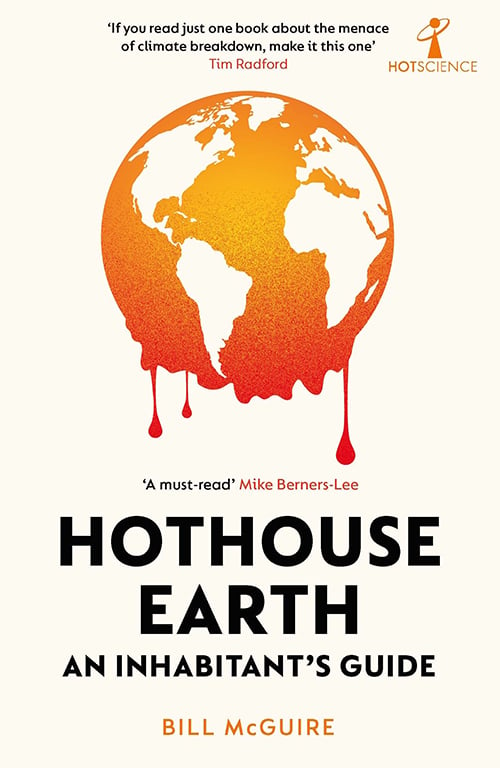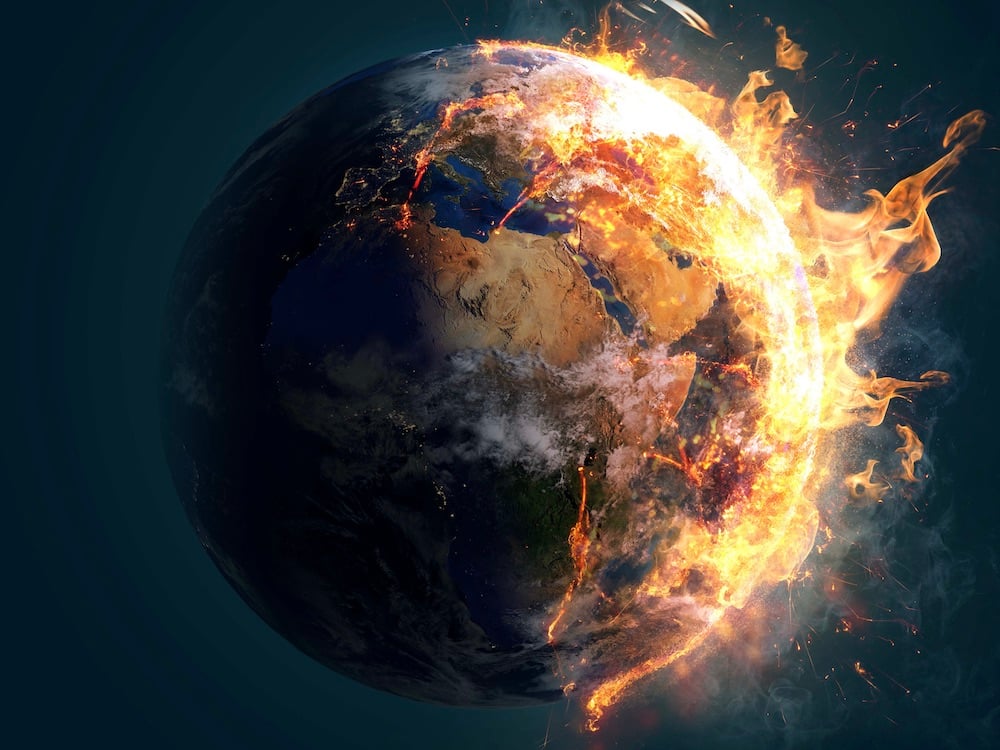- Hothouse Earth: An Inhabitant’s Guide
- Icon Books
Books on climate change follow a straightforward formula: We have a problem, it goes back to the industrial revolution, it’s getting worse and worse, it’s caused by burning fossil fuels, here’s where we could end up, so cheer up, do what you can to reduce emissions and vote for parties that promise to do the same.
Bill McGuire’s Hothouse Earth: An Inhabitant’s Guide is a typical example, but with some key differences. He’s got very current information up to the end of 2021, he’s a clear, concise writer, he has some surprising data — and he doesn’t try very hard to cheer us up at the end. Instead, he leaves us to ponder what to do if emissions keep rising, politicians keep promising and everything keeps getting worse.

McGuire is a volcanologist, author of several books (including a science-fiction novel), and professor emeritus of geophysical and climate hazards at University College London. He is familiar with current climate science and not very optimistic: “To have even the tiniest chance of keeping the global average temperature rise below 1.5 C, we need to see emissions down 46 per cent by 2030. In theory, this might be possible, but in the real world — barring some unforeseen miracle — it isn’t going to happen. Instead, we are on course for close to a 14 per cent rise by this date that will almost certainly see us shatter the 1.5 C guardrail in less than a decade.”
Prevention is impossible and mitigation is a faint hope. The question now, McGuire argues, is “how we can adapt to a hothouse world with more extreme weather and what we can do to stop a bleak situation from deteriorating even further.”
McGuire briskly sums up the past two centuries of global warming and its prophets, including the American Eunice Foote in 1856 and the Canadian physicist Gilbert Plass, who in 1953 predicted that growing CO2 emissions would raise the Earth’s average temperature by 1.5 F every hundred years.
Endless summers
“Since the middle of the 20th century,” McGuire writes, “the northern hemisphere summer has increased in length from 78 days to more than 95. By the end of this century, summers here are forecast to last half a year, with the duration of winter slashed to just eight weeks.”
One consequence of an impending 1.5 C temperature increase is already apparent: “a serious impact on food supplies.” Global production of corn in 2020 was down six per cent compared to the average for 1981 to 2010. Wheat and rice are also down.
McGuire dismisses the idea of moving farms north: “As far as agriculture is concerned, there are no winners in the global heating game. Everyone loses.”
Displacement of people is a recurring theme in the book. Drought, flood and rising sea levels will force hundreds of millions from their homes. “It is a recipe,” McGuire writes, “for human catastrophe that could well dwarf the scale of direct physical impacts due to a collapsing climate and potentially tear the fabric of many nations apart.” He cites one study predicting that “fully half of the world’s population will face severe food shortages by the end of the century.”
Water wars and plagues
Wars are already being fought south of the Sahara for resources like water and grazing land. Such wars will spread, and so will diseases — new viruses like Ebola and SARS-CoV-2, but also old reliables like cholera and a host of mosquito-borne diseases like malaria, chikungunya, Zika and dengue.
McGuire says the time to cut emissions is now. But to do so, he says, “Fossil fuel corporations have to be brought to heel, and quickly; the wellheads and coal mines shut down as soon as possible. There is no way the fossil fuel sector is going to do this voluntarily, so it must be compelled to leave oil, gas and coal reserves in the ground, and to stop exploring for more.”
Especially in the midst of the Russia-Ukraine war, such an outcome seems impossible. Instead, nations everywhere will extract and burn fossil fuels until they lose the ability to do so, or the global economy collapses.
The petroleum industry in Canada has been quick to criticize McGuire. In a news release, a Calgary-based group called Friends of Science questioned McGuire’s book and the recently passed U.S. climate plan. The release criticizes Hothouse Earth in part for coming out “during a time of summer heat waves around the globe.... Human beings are highly suggestible and often assume extreme weather events are driven by human-caused climate change. That’s not what the evidence shows.”
The release is itself evidence that McGuire’s book has alarmed the fossil-fuel industry.
‘Risk-informed decisions’
If we can’t prevent Hothouse Earth, then, we have to learn to live on it. While he’s excellent at describing what we’ll have to adapt to, McGuire doesn’t really suggest how to do it. New Zealand has just released a national adaptation plan, but its purpose seems chiefly to enable New Zealanders “to make better risk-informed decisions” to protect their own homes and livelihoods.
That’s like defining public health as a matter of “personal responsibility.” I expect adaptation will demand far more of Canadians than cutting emissions ever would have, because we’ll have to create utopias in a hellscape.
First of all, we have to climate-proof our cities and towns to keep them warm in winter, cool in summer, dry year-round and well supplied with clean air and water. The poorly housed will be doomed, a cost rather than a saving, when we will need every person we have just to get ourselves through serial disasters. So we need adequate housing for everyone, not just those who can afford it.
Such cities might be like the Saudis’ new urban fantasy Neom, but I doubt it. We’ll just have to retrofit and repurpose what we’ve got, and we’d better plan to expand our communities to make room for hundreds of thousands of climate migrants as well.
We’ll likely have to start from scratch. McGuire notes that in a survey of administrators of 800 of the world’s cities, “almost half said they had no plans for adapting to the impacts of global heating.”
How to feed everyone?
Then we have to ensure adequate nutrition for everyone, regardless of droughts and floods. Maybe we’ll need to convert high-rise condos into vertical farms, or brew protein. But junk food will be out of the question — too much processing, too many emissions and not enough nutrition.
Canada’s health system is already staggering under the attrition of Omicron’s subvariants. We will have to rebuild it and maintain it, whatever the cost.
The same is true of our schools and post-secondary institutions, which will have to overhaul their curricula to emphasize sciences, engineering and health — not business management — and recruit the best teachers and support staff they can.
As if this were not a hard enough sell (How are we gonna pay for it?), a climate-proofed Canada would not be a cheery, climate-controlled supermall in which we could amuse ourselves by consuming to our hearts’ content.
It would be a country of survivors, not consumers, accepting a spartan standard of living; like old age, it would be better than the alternative. We would be working hard just for a chance to see our grandchildren grow up with the same low standard of living — not to be even bigger consumers than we were.
We won’t save ourselves as individuals or as small fortified communities, easily erased by a pandemic or wildfire. We will have to save ourselves as a country, or we won’t save ourselves at all. ![]()
Read more: Rights + Justice, Environment
















Tyee Commenting Guidelines
Comments that violate guidelines risk being deleted, and violations may result in a temporary or permanent user ban. Maintain the spirit of good conversation to stay in the discussion.
*Please note The Tyee is not a forum for spreading misinformation about COVID-19, denying its existence or minimizing its risk to public health.
Do:
Do not: